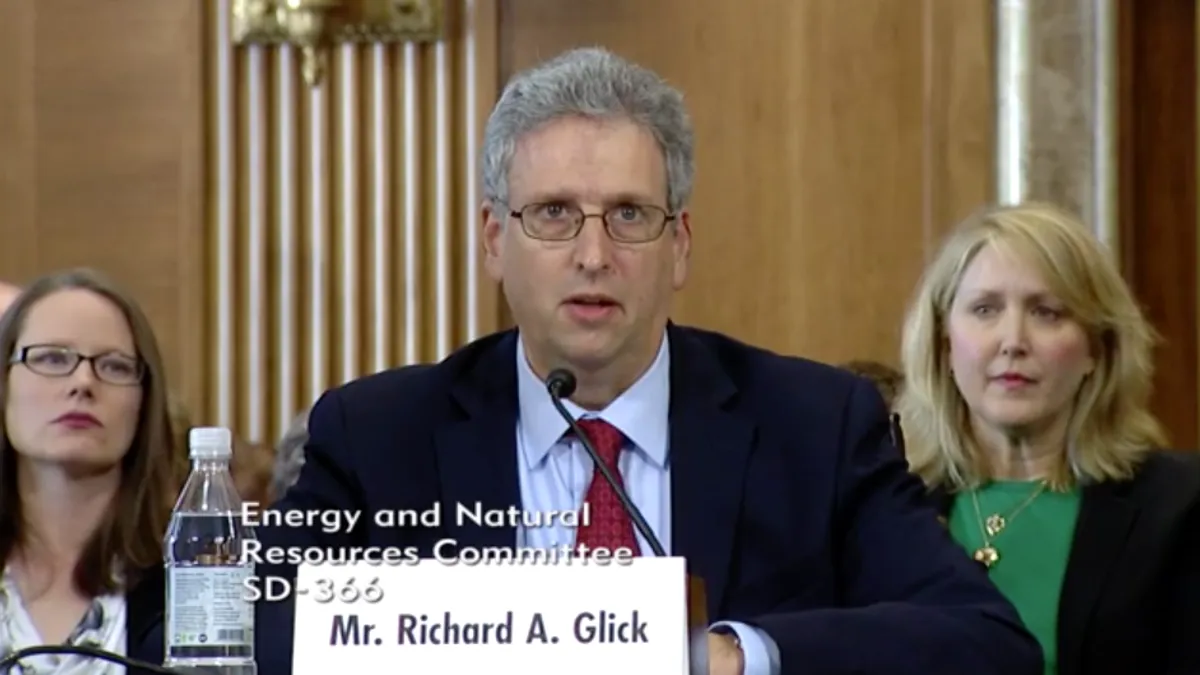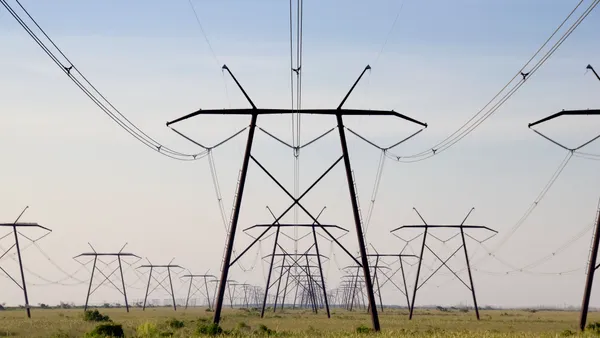Dive Brief:
-
Commissioner Richard Glick said Tuesday that updating transmission policy, reassessing capacity market operations in relation to their impacts on state policies, and continuing to lower barriers to nascent clean energy technologies would be top priorities if he is named head of the Federal Energy Regulatory Commission in 2021.
-
President-elect Joe Biden will likely choose a Democratic appointee to lead the commission after his expected inauguration Jan. 20, and is expected to replace current Chair James Danly with either Commissioner Richard Glick, or Allison Clements, whose nomination remains pending in front of the Senate. FERC analysts largely predict Glick will be chair.
-
"It's up to the new president to decide who leads the commission, and I'll let him do that," said Glick. But he does have a good idea of what he would prioritize as chair, he added while speaking at an American Council on Renewable Energy virtual conference.
Dive Insight:
Glick has been a vocal opponent of many of the commission's actions over the past few years, particularly rules like the Minimum Offer Price Rule (MOPR) expansion in the PJM Interconnection, which he sees as directly impeding on state resource decisions. The rule effectively raises the floor price for all state-subsidized resources bidding into the grid operator's capacity market, a change that was roundly criticized by the renewables industry as well as some states within the market.
"I just don't think it's sustainable," said Glick. Though he believes regional transmission organizations provide "significant benefits, especially in terms of integrating massive amounts of new renewable resources at a relatively cost effective basis," he fears policies like the MOPR could continue to drive states away from organized markets. Illinois, New Jersey and Maryland have all threatened to exit the PJM capacity market because of their frustration with the MOPR rule.
"The last thing we all want to see is … RTOs be pulled apart," he said. "But that's what's going to happen if we continue to block the state programs. The states are going to say 'Why should I allow my utilities to participate?'"
For him, the solution is reassessing what the organized wholesale markets need in order to prevent further conflict between state clean energy policies and RTO operations.
"We need to reassess how capacity markets operate. And in particular, how we deal with state policies," he said. "I would prefer more of an accommodating role, not a blocking role."
The MOPR order is currently being reviewed in federal appellate courts, and the result of that litigation will determine the commission's path forward, Glick said.
"In my opinion, I think the commission has well exceeded its legal authority," he added.
Glick would also like to see the commission continue its progress on lowering barriers to nascent technologies in the market.
FERC in July held a technical conference on hybrid resources, which he said was "really illuminating," and makes him think the commission could give developers clarity on interconnection issues, among other things.
Finally, Glick said he'd like to revisit transmission policy, which he says will be especially essential under the Biden administration.
"President [elect] Biden has significant goals, we certainly have international goals, [and] a lot of states have goals,"he said. "And a lot of those goals aren't … going to be met, unless we can access significant amounts of remotely located renewable resources. We're not going to be able to do that unless we build out the grid more significantly than we have been."
Glick also acknowledged he could not pass these policies on his own. If Glick is appointed chair, the commission would likely still hold a Republican majority. Along with Clements, the nomination of Republican appointee Mark Christie, who currently leads the Virginia State Corporation Commission, is also pending. The Senate Energy and Natural Resources voted for both nominees today, forwarding them to the full Senate for confirmation.
Analysts have said Christie could provide an important pro-state voice to the commission, while Clements is expected to vote favorably with Glick on many of his priorities. In addition, Chatterjee is a proponent of reducing market barriers, and has said he would like to see transmission policy updated. Chatterjee's term is up in June, while Christie and Clements would serve until 2025 and 2024, respectively, if approved. Danly's term is up in 2023.















